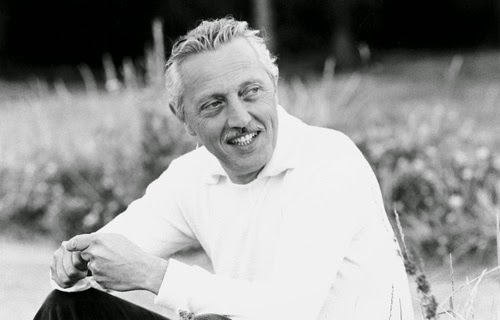| Dr. Jerome Lejuene, discoverer of cause of Down syndrome |
I discovered I was pregnant with my fourth child very early in February of 1984. I was 42 and certainly not expecting to be expecting, but Jerry and I rolled with the punches and were soon changing our life course and making new plans.
Those plans didn't include the possibility of abortion. The reasons for that are complex, because we were not members of any organized pro-life movement or organization. It's more that we just loved new life, whether it came in the form of a seedling peeping up out of the ground, a litter of puppies, or…a baby.
So I rejected the amnio that would have told me our little one was busy developing an overabundance of chromosomes. Midway through the pregnancy, I even had a mystical experience that I felt told me the baby would be a girl with Down syndrome. But no matter. Life is life. I figured if the universe bothered to tell me about it, it would tell me what to do about it.
In September of 1984, here came Miss Kelly Page Horton, 8 pounds, 7 ounces, bald and beautiful. It was obvious from the moment she popped into the world.
Frankly, we were less than thrilled. We were just getting back on our feet a few days later when we got news that she might have neo-natal leukemia. At that point the mom and pop tiger genes in us rose up and roared and we knew we wanted this baby in no uncertain terms.
When Kelly was five weeks old, the National Down Syndrome Congress convention came to San Antonio. Daughter Martha and I drove down to see what we could learn.
Talk about a revelation! A doctor from the City of Hope in Duarte, CA, informed me that Kelly didn't have leukemia, but a “leukemoid reaction,” fairly common at birth in Down syndrome. He also said it would go away without treatment and she would bear no uncommon risk in the future. Whew.
But we had also just received Kelly's karyotype, which showed, most curiously, four No. 21 chromosomes. This was, needless to say, worrisome to us (and unheard of by our physicians). If one extra chromosome could gum up the works, what would two do?
Fortunately, the very man who discovered the cause of Down syndrome was present at the conference.
Jerome Lejuene was a French researcher, who in 1958 identified that an extra 21st chromosome causes the syndrome named after the man who first described it, John Langdon Down.
When I read that Lejuene was presenting a plenary session, I imagined he must now be very old, and I was surprised by the youthfulness and vigor of the man who stepped in front of the microphone. In fact, at that point he was 57 years old; he had made his discovery at 34.
Unfortunately, the combination of his strong French accent, my own rather poor hearing, and the acoustics of the hall ensured that I caught very little of his message. Still, I figured he would be interested in Kelly's karyotype, and I was interested in his take on it, so I stood in line to speak with him.
When my turn came he smiled and welcomed the paper I handed him. He knew immediately of my concern, even before I said anything. I will never forget his warmth and compassion as he explained that he felt certain she would develop typically as a child with Down syndrome. I could feel that I was in the presence of someone very special.
First of all, he had come all that way to be with us, a random clutch of moms and dads with one thing in common. It amazed me that he would do that. I doubted that most scientists who had made a discovery of such monumental importance would bother much with the real-life consequences.
But as it turns out, Jerome Lejuene was far from typical in that respect. In a sense, he spiritually adopted each and every child born with Down syndrome, and he cared deeply about their lives. As pre-natal tests were developed to identify, and in most cases, eliminate the growing baby with Down syndrome. he began to speak out for their right to live.
The scientific community did not share his view, and over time he was in effect shunned, viewed as unprofessional, no doubt.
Yes, I was indeed in the presence of someone very special. Today the Jerome Lejuene Foundation, established in his name, works on behalf of people with Down syndrome, funding medial research to work for “care and a cure.”
There is also a movement working to recognize the sainthood of Jerome Lejuene. That he was one, there is no doubt. I didn't identify it at the time, but it's what I felt in his presence: exceptional holiness.
He wrote: Human genetics can be summarized in this basic creed: In the beginning is the message, and the message is in life, and the message is life. And if the message is a human message, then the life is a human life.
Amen.
Picture credit: Fondation Jerome Lejeune via Wikimedia (CC BY-SA 3.0).
